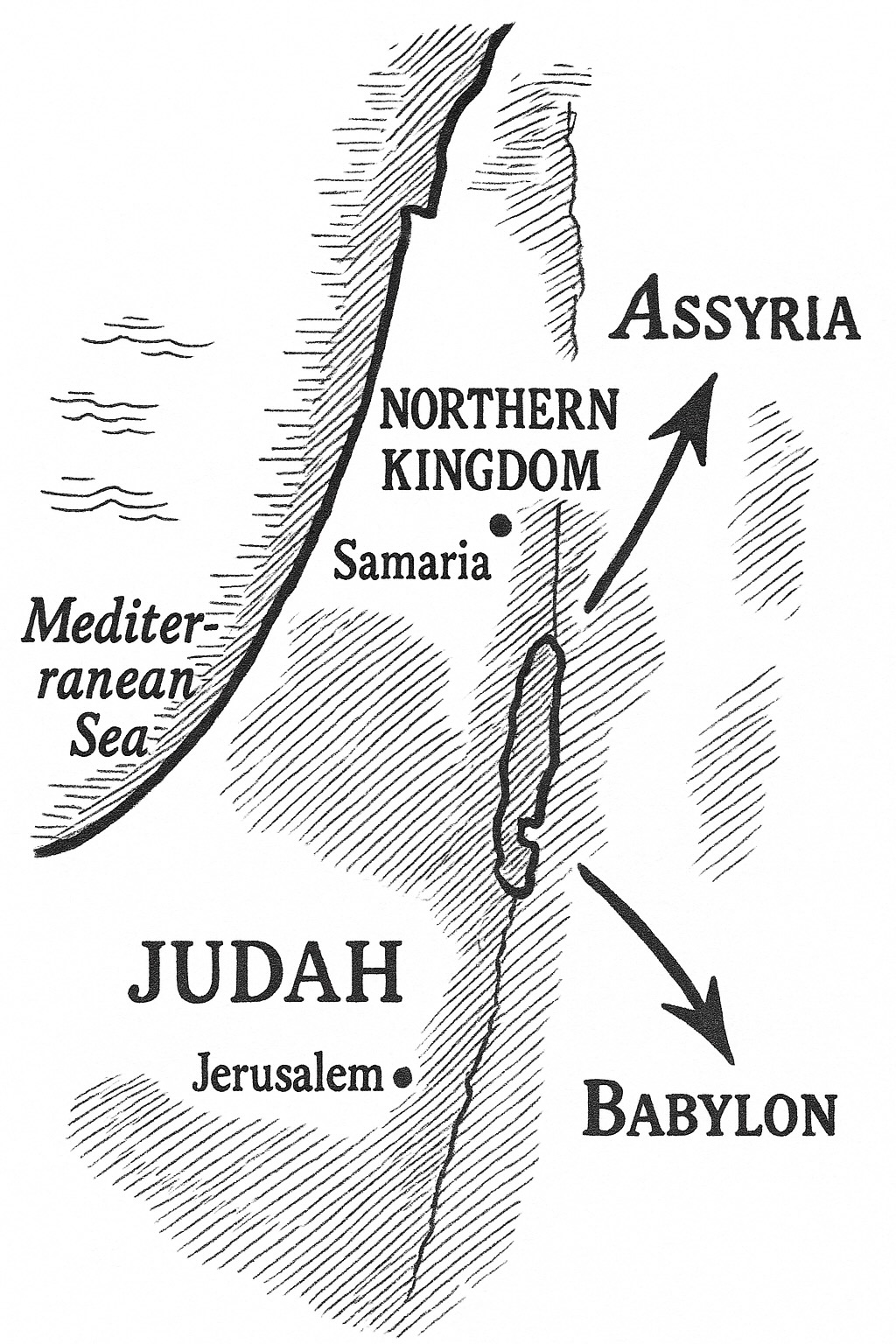Storylineનમૂનો


Exile
The northern kingdom of Israel: 722 BC
The southern kingdom of Judah: 586 BC
Books of 2 Kings, 2 Chronicles, Jeremiah, Ezekiel, Daniel, Lamentations & Obadiah
Interesting note:
The prophet Daniel was a young man when He watched Judah fall to the Babylonians. He was taken as a captive to Babylon where he became an advisor to King Nebuchadnezzar. After the Medes defeated the Babylonians, Daniel became an advisor to King Darius the Mede, and he was still alive when Cyrus the Great decreed the return of the Jewish exiles. Daniel's life spans three major periods in Israel's history: the fall, exile and return.
__________________
~ Before the exile, both Israel and Judah increasingly abandoned their covenant with Yahweh, falling into deep moral and spiritual decline.
At last, the judgments of God fell. In 722 BC, the mighty and cruel Assyrian empire swept through the northern kingdom of Israel. The walls of Samaria fell, the land was ravaged, and the ten tribes were scattered among the nations.
Judah did not learn from her sister’s downfall. In 586 BC, the Babylonian army laid siege to Jerusalem, broke through the walls, and burned the holy Temple of God. The people of Judah were carried into exile in waves. The first exiles consisted of the royal family and noble youths to serve in the Babylonian court. Among these captives were Daniel, Hananiah, Mishael, and Azariah—later known for their faith and courage (Daniel 1:1–7). Nebuchadnezzar also seized treasures from the Temple of the Lord and placed them in the temple of his god in Babylon (2 Kings 24:1, Dan. 1:2).
Prophets like Jeremiah wept over Jerusalem, while Daniel interceded from Babylon. God spoke promises of hope: After seventy years, He would bring His people back. A faithful remnant would rise. One day, He would restore them fully.
~ After the Babylonian exile, the Israelites as a people did not return to the widespread idol worship that had marked their earlier history. The exile itself was seen as God’s judgment for their persistent idolatry (worship of Baal, Asherah, Molech, etc.), and it cured the nation of this sin on a national scale.
Significance
- This period brought tragedy and a testimony—a tragedy of disobedience that led to destruction, but also a testimony to the relentless mercy of God, who never abandoned them. God has promised never to leave or forsake His people. (Heb. 13:5)
- The Lord preserved a faithful remnant (Daniel, Ezekiel, Esther, Mordecai, and many others) through whom His promises continued. There is always a remnant who stands firm for God.
- The exile forced God’s people to learn how to live as a scattered people among the nations, shaping Jewish identity for the years to come. Difficulty and stress can strip away the unnecessary in our lives and bring the important into focus. It can even strengthen our God-given identity.
- The exile revealed the seriousness of sin and the reality of God’s judgment. All our works will pass through fire. It is good for us to remember. (1 Cor. 3:12–15)
About this Plan

Just as shelves bring order to a closet, this Bible plan builds a powerful framework to clarify and connect our understanding of the events of the Bible as a whole. Each day becomes a shelf—organizing epic moments, unforgettable characters, the unfolding drama of God’s Word. Together, we will step into His unrelenting redemptive plan as our own story is woven into the Lord’s glorious plan.
More
સંબંધિત યોજનાઓ

16 Characteristics of the God-Kind of Love - 1 Corinthians 13:4-8

Sharing Your Faith in the Workplace

Am I Really a Christian?

Positive and Encouraging Thoughts for Women: A 5-Day Devotional From K-LOVE

Living Like Jesus in a Broken World

Who Am I, Really? Discovering the You God Had in Mind

Gospel-Based Conversations to Have With Your Preteen

Reimagine Influence Through the Life of Lydia

Overcoming the Trap of Self-Pity
